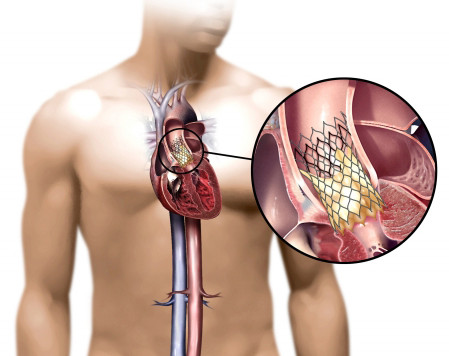Pioneering heart valve operation avoids open heart surgery
A pioneering new heart valve that can be placed inside a patient without the need for open heart surgery has been used for the first time in the UK by a team of cardiologists and heart surgeons at St George’s Hospital, London.
The Medtronic Evolut R valve was successfully implanted in two patients in back-to-back procedures led by cardiologist Stephen Brecker and cardiac surgeon Marjan Jahagiri.
A cylindrical shaped wire mesh containing the heart valve is placed onto the end of a catheter in a capsule. It is then inserted through the artery in the groin on its one metre journey to the heart where it is positioned and opened.
Dr Brecker said: “The great advance of this new generation valve is the ability to position it within a millimetre of the target. If the surgical team isn’t happy then the valve can be collapsed, repositioned and reopened.”
“The procedures went smoothly and we got the valves perfectly positioned on the first attempt. I think this technology may be a real game changer in heart surgery.”
Traditional trans-catheter aortic valve implants have been routinely used for the past six years to replace diseased or damaged valves that control the flow of blood out of the heart.
If a valve doesn’t fully open fully it stems the flow of blood out of the heart causing excessive strain on the heart muscle. This can lead to heart failure and sudden death.
Dr Brecker, who also acted as a clinical advisor in the valve’s development, said: “It’s a deceptively simply device but its implications are far reaching. It means quicker, safer and minimally invasive procedures with faster recovery time for patients.”
The two-hour long procedures were carried out on two women in their 80s with aortic valve disease and only sanctioned after months of planning and meeting the requirements of various regulatory bodies.
Dr Brecker added: “The patients involved were both enthusiastic to be part of this clinical trial and it’s important to recognise their contribution. We tend to focus on the technology and skills involved without realising that without willing patients we wouldn’t get off square one.
The hospital estimates it will carry out more than 50 of the new procedures during 2014. St George’s carried out the procedure in the same week as its counterpart at the Royal Victoria Hospital, Belfast.
Notes to editors
For more information, please contact the Communications Unit on 020 8725 5151 or email communications@stgeorges.nhs.uk. Outside working hours, please page us by calling 0844 822 2888, leaving a short message and contact details for pager SG548.
About St George’s Healthcare NHS Trust
- St George’s University Hospitals NHS Foundation Trust is one of the largest healthcare providers in the UK. Its main site, St George’s Hospital in Tooting – one of the country’s principal teaching hospitals – is shared with St George’s, University of London, which trains medical students and carries out advanced medical research. As well as acute hospital services, the trust provides a wide variety of specialist and community hospital based care and a full range of community services to children, adults, older people and people with learning disabilities. These services are provided from Queen Mary’s Hospital, Roehampton, 11 health centres and clinics, schools and nurseries, patients’ homes and Wandsworth Prison.
- St George’s Hospital, Tooting, is home to one of four major trauma centres, one of eight hyper acute stroke units and one of the biggest and busiest of the seven heart attack centres in the capital.
- The trust is an accredited centre of excellence for trauma, neurology, cardiology, cancer and blood pressure services and is the national centre for family HIV care and bone marrow transplantation for non-cancer diseases.
- In 2012 the trust was named by the Dr Foster report for the Department of Health in the group of trusts with the lowest mortality rates in the country. The trust was one of only 16 in the country to have statistically significant lower than expected mortality rates.


